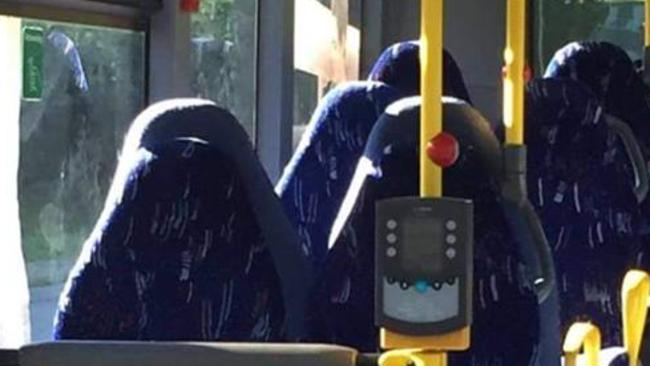Anti-immigration group mistakes bus seats for burqas
THIS photo unleashed a wave of negative comments about women wearing burqas — but they should have taken a second look.

AN ANTI-IMMIGRATION group in Norway is being mocked by social media users after they mistook empty bus seats for Muslim women wearing burqas.
The image of the bus carriage showing six empty seats was posted to the closed group Fedrelandet Viktigst, which translates to “Fatherland First”.
The post was shared with the group’s almost 13,000 members by Facebook user, Johan Slattavik who captioned it, “What do you think of this?”
MORE: Austrian police force women to uncover their faces as country’s ‘burqa ban’ comes into force
The post sparked a strong response from members who posted comments such as, “disgusting”, “frightening” and “tragic”.
One user even said, “It looks really scary, should be banned. You can never know who is under there. Could be terrorists with weapons.”
Slattavik told local news organisations that it was a little practical joke and he wanted to see how people would react.
“I laid out the photo to see what happened,” he said, adding that he was shocked so many people fell for it.
Sindre Beyer, a former politician, noticed the mistake and shared the post on his account.
It now has around 2000 shares and social media users are not holding back on their criticism of the group’s prejudice. Users have posted comments such as, “New ad for Specsavers?” and, “the meanest are always the stupidest.”.
With an ongoing debate about extremism and freedom raging in Europe, Norway was the first Scandinavian country to propose a ban on full-face veils in schools and universities last year.
The high influx of Muslim immigrants into Europe over the last few years is believed to have fuelled scepticism and prejudice throughout the continent. France, Belgium, Bulgaria, the Netherlands and Switzerland all have laws and restrictions on the burqa or niqab.
Norway’s Integration and Diversity Directorate has posted a summary surrounding the country’s attitudes towards immigration and diversity. The report contains a section on attitudes to people with different religious beliefs which concluded, “A clear majority are sceptical of Muslims.”
According to the summary, the proportion that is sceptical of Muslims is a high in the whole population, regardless of religiosity.



